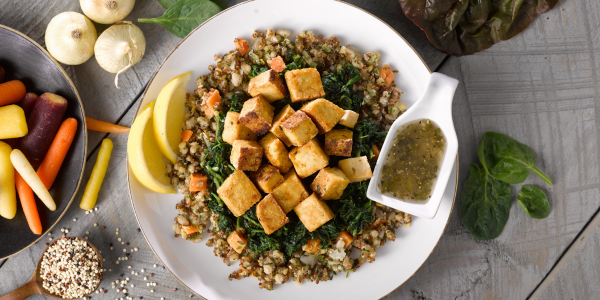
It seems like everyone’s been raving about plant-based eating lately—and for good reason! The benefits of vegan diets have been highlighted, from environmental efforts to personal wellness.
If you’re interested in trying out a vegan diet for weight loss, it’s important to understand both the benefits and risks, including challenges you might encounter along the way.
Ahead, find answers to common questions about eating entirely plant-based, such as "What is a vegan diet?" and "Can I lose weight on a vegan diet?" Plus, find tips for a vegan diet plan complete with plenty of high-protein, low-carb vegan foods.
What Is a Vegan Diet?
On the spectrum of plant-based diets, eating vegan is often viewed as the most strict. However, many people attribute their excellent health to this pattern of eating.
Following a vegan diet entails avoiding all animal products, including byproducts like honey (if you so choose). Unlike those following lacto-ovo or lacto-vegetarian diets, vegans avoid eating eggs, milk, and dairy in addition to meat. Vegans also leave poultry, eggs, and fish off the menu.
So what can vegans eat? Even when cutting out animal products, there are plenty of plant-based foods to complete the diet—the term "plant-based" doesn’t just refer to foods that look like plants like fruits and vegetables. Plant-based eating patterns also include nuts, seeds, beans, and grains.
Benefits of a Vegan Diet
Many people have their interest peaked by the fact that vegan diets are associated with health benefits. Beyond prompting you to get creative with spices and flavors, vegan eating can add value to your life in other ways.
It May Be Linked to Longevity
It’s true that a vegan diet may add years to your life. While it’s estimated that nearly 10 million people in America are vegans, it’s harder to access this population for research. So, much of the existing research on plant-based eating benefits has been conducted with vegetarians.
In either case, it’s clear that plant-based eating has benefits. Vegetarian diets have been linked to lower all-cause mortality (death) and even some mortality cases due to specific causes. In other words, eating a balanced vegan diet may increase your odds of living longer.
A Host Of Preventative Health Benefits
In addition to potentially increasing longevity, eating vegan may reduce your risk for disease. Eating primarily plant-based may play a key role in preventing quality-of-life-altering, chronic diseases and conditions, such as:
• Alzheimer’s disease
• Certain cancers (i.e. prostate)
• Cardiovascular (heart) disease
• High cholesterol
• Insulin resistance
• Metabolic syndrome
• Type 2 diabetes
As an added benefit, vegan diets contain pre- and probiotic-rich foods. From high-fiber fruits and veggies to probiotic-rich fermented foods (like sauerkraut, kimchi, pickles, and tempeh), vegan diets prime your body for better gut health. More "good" bacteria can help to balance your body and can affect aspects of your health beyond intestinal issues.
Improved Health Outcomes (Including Weight Loss!)
Generally, a plant-centered diet is lower in calories and fat than the average American diet. Vegan diets can successfully be made into a high-protein and low-carb diet, which is often recommended for weight-related conditions like obesity and type 2 diabetes.
A vegan diet can double as a diet for weight loss, too. In fact, predominantly plant-based diets have been shown to lower levels of weight gain and obesity, along with related risks like heart disease and high blood pressure.
Another reason weight loss is often associated with a vegan diet is that focusing on plant-based foods will likely reduce your intake of nutrient-poor alternatives. For example, by consuming more healthy fats—like omega-3 fatty acids—from nuts and seeds, you’ll probably avoid saturated fats from foods like chips, cookies, or pastries.
A More Pure Form Of Fuel
As many famous athletes (like Tom Brady) can attest, eating mostly plant-based can be the key to performance in sports. Thanks to documentaries like The Game Changers, plant-based eating patterns are becoming more popular. The idea that vegans are "skinny" and "starving" is simply false, and beefed-up athletes are proving plant foods can fuel performance.
Scientific studies are on board, too. In fact, research shows that eating more plants may improve athletic ability by reducing indicators of inflammation and providing a performance advantage for athletes.
Animal foods, especially options like red meat, often take longer for the body to break down. This can bog athletes down and the effects of digestion can interfere with practice or play. With tight training or game schedules, opting for plant-based meals makes sense.
Risks of a Vegan Diet
As with any other diet, eating vegan has its risks. If you choose to eat vegan, you'll primarily be concerned with getting enough calories and nutrients each day. Luckily, careful label reading can help you select the right foods for your lifestyle.
Poor Planning Can Increase Deficiency Risk
While any poorly planned diet can contribute to a deficiency, vegans are especially at risk for under-consuming certain nutrients. Since the following vitamins and minerals are usually found in animal-based products and byproducts, vegans may need to take special attention to supplementing these in their diet:
• B-vitamins like niacin and vitamin B-12
• Vitamin D
• Calcium
• Iodine
• Iron
• Potassium
• Selenium
• Zinc
• Omega-3 fatty acids
Bone health is of particular concern since vitamin D and calcium consumption has a tendency to be lower in vegans. Looking for fortified foods and beverages can help vegans enjoy their favorite foods while also getting adequate nutrients.
It’s Not Automatically "Healthy"
For some people, eating a vegan diet may be the key to better health. However, vegan foods aren’t automatically "healthy." Oreos are considered vegan, but eating a sleeve of sandwich cookies isn’t recommended as a healthy snack.
This same principle applies to other trending diets, such as the keto diet, too. It’s important to keep in mind that while a label may read "plant-based," "vegan," "keto," or "paleo," it’s not automatically a "healthy" option. Looking at the label and understanding the levels of added salts, sugars, and fats can help you decide if a certain item would be a healthy choice for you.
As a vegan, you’ll also want to carefully examine the ingredients list for sneaky animal-based ingredients like gelatin. Depending on the extent of your vegan lifestyle, you’ll also want to understand how the product is produced and what steps store-bought brands are taking to ensure animal welfare.
How to Create a Healthy Vegan Diet Plan
Unsure of where to start? BistroMD's Vegan Program conveniently offers nutritionally-balanced, chef-prepared vegan meals right to your door!
You can also focus on adopting the below tips to create a healthy vegan diet on your own.
Focus on High-Quality Proteins
One pervasive myth about vegans is that they don’t consume enough protein, there are actually many plant-based foods high in protein. In fact, there are plant foods that offer all essential amino acids (the building blocks of protein) needed by the body.
Plants can provide plenty of protein, even if you’re avoiding meat. The following plant-based foods can help you add vegan protein to your diet:
• Beans
• Legumes (beans, lentils, peas)
• Nuts and seeds
• Plant-based protein powder
• Soy-based protein
Pair With Whole Grains
In addition to being a good source of protein, whole grains supply fiber to the diet. Plant-based diets can easily become too high in carbohydrates since many refined grains count as "vegan." Focusing on whole grains, and making at least half your grains whole each day, can ensure you’re eating in the best interest of your health.
Instead of adding up carbs and obsessing over the math, try to locate grams of net carbs. Many times, the fiber provided by plant-based options can "cancel out" some of the carbohydrates. Taking a gentle approach to carbohydrate counting can help you become more aware of the quality of carbohydrates you consume.
The good news? Most whole grains are vegan, including the following popular picks:
• Brown or wild rice
• Buckwheat
• Corn and popcorn
• Oats
• Quinoa
Explore Flavor Profiles & Eat What You Enjoy
Vegan eating isn’t meant to be a chore. If you’re just starting out, add more vegetables to foods you already eat and enjoy. So if you’re used to eating pasta or rice-based dishes, begin there!
Once you get comfortable eating primarily plant-based, you can experiment with new and exciting flavor profiles. Many Eastern foods like curry can easily be made without meat or milk, or by using tofu or tempeh instead of animal protein.
Although you’ll have to look closely and carefully at the label, many meat-free, soy protein alternatives are available if you want the texture of meat without any animal products like Impossible Foods.
Find Fortified Alternatives
Speaking of plant-based alternatives to animal products, many alternative milks and dairy products are also available. However, if you’re worried about getting necessary nutrients, seeking a substitute fortified with vitamins and minerals is crucial.
For example, many soy and nut milks are fortified with calcium and vitamin D to ensure they offer a comparable nutrient profile to animal-based milks.
As mentioned above, you’ll want to ensure other foods you eat are fortified with nutrients you may be deficient in. Fortified breakfast cereals, grains, and nutritional yeast often come with a boost of vitamin B12—which vegans are more likely to be deficient in.
Ready to Begin Eating Vegan?
While eating more plant-based does take some planning, it’s a pattern you can start today. Vegan and vegetarian diets, in particular, are associated with health benefits.
Simple tips for vegan eating, such as eating fortified foods as a preventative measure, can help enrich your diet and make plant-focused eating more enjoyable (and tasty).
References
Bakaloudi DR, Halloran A, Rippin HL, Oikonomidou AC, Dardavesis TI, et al. Intake and adequacy of the vegan diet. A systematic review of the evidence. Clin Nutr. 2021;40(5):3503-3521.
Barnard ND, Goldman DM, Loomis JF, Kahleova H, Levin SM, et al. Plant-Based Diets for Cardiovascular Safety and Performance in Endurance Sports. Nutrients. 2019;11(1):130.
Busetto L, Marangon M, Stefano FD. High-protein low-carbohydrate diets: what is the rationale? Diabetes Metab Res Rev. 2011;27(3):230-2.
Cleveland Clinic. What Is Veganuary? And Why You Should Take the Challenge. Health.clevelandclinic.org. Published December 2022.
Ellis E. Vegging Out: Tips on Switching to a Meatless Diet. Eatright.org. Published February 2020.
Klemm S. Vegetarianism: The Basic Facts. Eatright.org. Published October 2021.
Marrone G, Guerriero C, Palazzetti D, Lido P, Marolla A, et al. Vegan Diet Health Benefits in Metabolic Syndrome. Nutrients. 2021;13(3):817.
Mayo Clinic Staff. Vegetarian diet: How to get the best nutrition. Mayoclinic.org. Published March 2023.
McMacken M, Shah S. A plant-based diet for the prevention and treatment of type 2 diabetes. J Geriatr Cardiol. 2017;14(5):342-354.
McManus KD. With a little planning, vegan diets can be a healthful choice. Health.harvard.edu. Published February 2020.
Orlich MJ, Singh PN, Sabaté J, Jaceldo-Siegl K, Fan J, et al. Vegetarian dietary patterns and mortality in Adventist Health Study 2. JAMA Intern Med. 2013;173(13):1230-8.
Physicians Committee. Plant-Based Diets. Pcrm.org. Accessed May 2023.
Selinger E, Neuenschwander M, Koller A, Gojda J, Kühn T, Schwingshackl L, et al. Evidence of a vegan diet for health benefits and risks - an umbrella review of meta-analyses of observational and clinical studies. Crit Rev Food Sci Nutr. 2022.
Stevens N. Whole Grains For A Nutritionally Balanced Vegan Diet. Lettucevegout.com. Accessed May 2023.
Soylent. Vegan Statistics 2023. Soylent.com. Accessed May 2023.
Tomova A, Bukovsky I, Rembert E, Yonas W, Alwarith J, et al. The Effects of Vegetarian and Vegan Diets on Gut Microbiota. Front Nutr. 2019;6(47).







